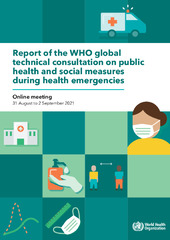Public health and social measures (PHSM) have been applied at an unprecedented scale to limit the spread of COVID-19 and prevent illness in communities globally. Yet, many questions in relation to PHSM are still unanswered, such as: How do we evaluate the acceptability and effectiveness of PHSM? How do we measure the social, health and economic consequences of PHSM? What methods can we use to answer complex questions about what PHSM should be introduced, in what combination, at what time, and for how long?
The WHO global technical consultation on public health and social measures during health emergencies discussed these key questions. The event was held virtually from 31 August to 2 September 2021. The consultation convened 67 experts from 25 countries representing a broad range of disciplines.
The consultation began with an introduction to the WHO initiative to measure the effectiveness and impact of PHSM during emergencies. Participants were then divided into two streams for smaller group discussion. The methods stream focused on exploring methodologies and approaches for monitoring and evaluating PHSM. The policy stream focused on exploring implementation considerations and how to move evidence to policy action. The consultation concluded with a plenary session summarizing the discussions and charting a course towards a cohesive global PHSM research agenda.
Key insights from the expert consultation
First, the successful implementation and evaluation of PHSM requires multidisciplinary teams from research and policy. Collaboration early and often must be a cornerstone of PHSM research and implementation and be actively sought across disciplines, sectors, and geographies.
Second, PHSM research should embrace diverse study designs with an aim to generate robust and rapid evidence. Developing standards, protocols, and tools using common indicators and approaches can facilitate the harmonized and comparable research during emergencies.
Third, PHSM research should proactively include communities and decision-makers early on to ensure research outputs are relevant and actionable to those who need them most.
During the COVID-19 pandemic, WHO has contributed to international coordination and cooperation in clinical research, undertaking similar coordination for PHSM is of key interest to WHO and its Member States as a key pillar for global pandemic preparedness.

